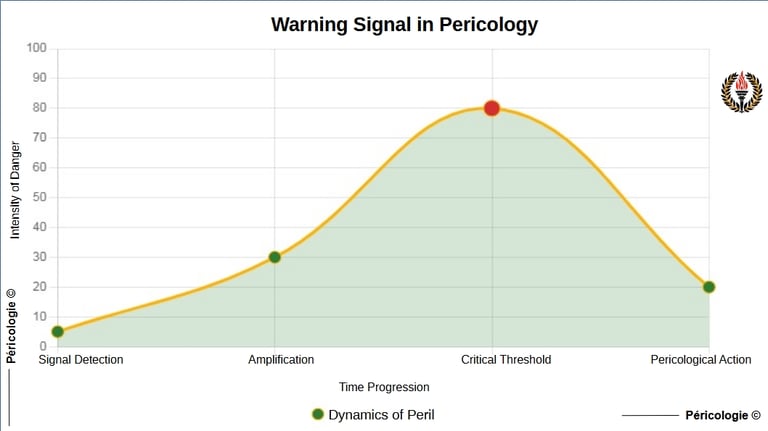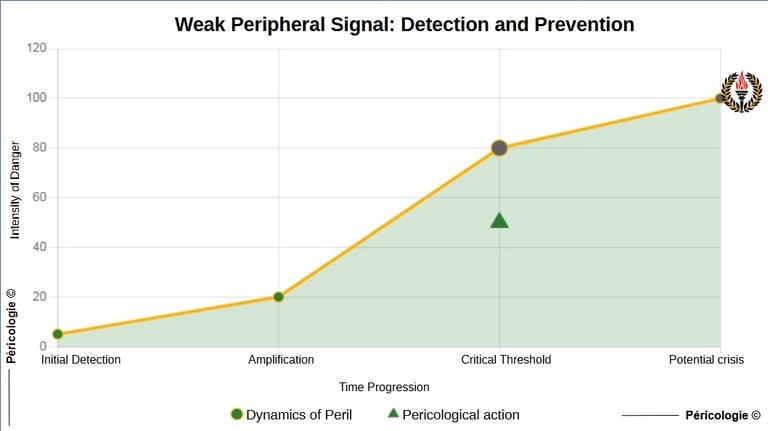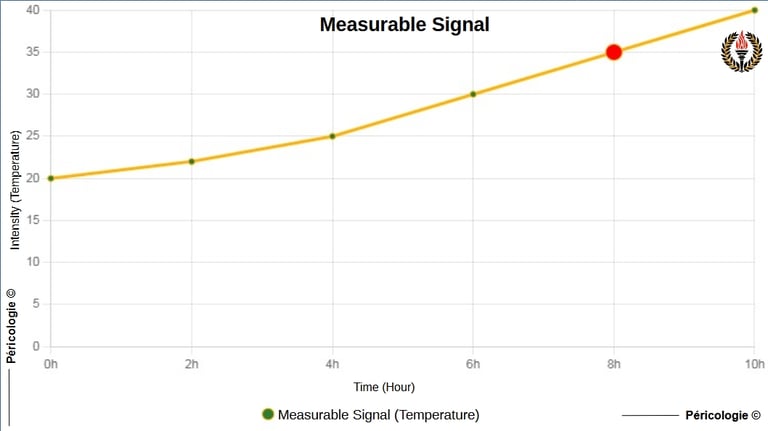The Signals of Pericology
Warning Signal
In the context of Pericology, a "Warning Signal" refers to an early, often discreet but detectable, indication of the potential emergence of a systemic peril, whether biological, socio-cultural, technological or systemic. This signal, observable via bio-inspired methods or analytical tools, makes it possible to anticipate an imbalance before it reaches a critical threshold or a tipping point. Unlike obvious signals, it requires peripheral vigilance to be detected, mobilizing the pillars of Pericology : proactive observation, methodical analysis and preventive action. Example of application : a slight increase in interpersonal conflicts in a team can signal a danger of collective disorganization, detectable by behavioral indicators. Inspired by natural dynamics, Pericology translates these clues into concrete actions to block the peril.


Warning Signal
Warning signal diagram
Pericological Example
Context : In a city dependent on a logistics network for food distribution, repeated but minor delays in fresh produce deliveries (e.g., 10-15 minutes over several days) are observed in a specific neighborhood. These delays, discreet and not yet critical, constitute a warning signal of a potential systemic peril : a supply disruption due to an overloaded road network or a technological failure (e.g., malfunctioning traffic management systems).
Pericological Application : A pericologist, applying the Pericology methodology(Explore, Analyze, Decode), uses bio-inspired observation(inspired by ants adjusting their routes in the face of obstacles) to detect this weak signal. He analyzes traffic data and identifies an abnormal increase in travel time (measurable signal). By acting proactively, he proposes an adjustment of the routes via a flow distribution algorithm, avoiding a tipping point (e.g.: total disruption of deliveries).
Etymology
Signal : From the Latin signum ("sign, mark"), designating an indicator or an observable manifestation of a phenomenon.
Forerunner : Derived from the French avant (Latin ab ante , "in front of") and coureur (Latin currere , "to run"), literally "that which runs in front of", i.e. a precursor announcing an event.
Pericological Sources
Weak Peripheral Signal
A "Weak Peripheral Signal" refers, in Pericology, to a subtle indicator, often difficult to detect without increased vigilance, which announces the potential emergence of a systemic peril at the periphery of a system (human, biological, technological or interconnected). These signals, although discreet, are measurable and carry critical information on emerging risk dynamics, before they reach a critical threshold or a tipping point. They are distinguished from warning signals by their less obvious nature and from measurable signals by their low amplitude, requiring methodical and bio-inspired observation. The weak peripheral signal is central to proactive anticipation, allowing us to "see before" in order to "block before", in accordance with the slogan of Pericology.


Weak Peripheral Signal
Weak Peripheral Signal Diagram
Pericological Example
Context : In an interconnected automated factory, micro-variations in the energy consumption of machines (e.g. +2% on a unit) go unnoticed by standard control systems, because they are below the classic alert thresholds.
Pericological Application : A pericologist, acting as an observer, uses a bio-inspired approach (predator detection model in a bird colony) to identify these micro-variations as a weak peripheral signal. By analyzing the data via Ecosynpraxy, he models a potential cascading overheating (tipping point). A proactive action is proposed: dynamically adjust the load of the machines to stabilize the system, avoiding a systemic failure.
Etymology
Signal : From the Latin signum ("sign, mark"), designating an observable indication referring to information or an event to be interpreted.
Peripheral : Derived from the Greek peri ("around") and pherein ("to carry"), meaning that which surrounds or frames a central system.
Weak : From the Latin flebilis ("worthy of being mourned", then "fragile, weak"), indicating a reduced intensity, difficult to perceive without methodical attention.
Pericological Sources
Measurable Signal
In the context of Pericology, the "Measurable Signal" refers to the concrete, quantifiable and observable indicator that reveals the presence or evolution of a systemic peril before it reaches a critical threshold. This signal, resulting from biological, human or technological dynamics, is detected by rigorous observation tools (sensors, statistical analyses, or contextual data) and translated into exploitable data to anticipate and counter the perils. Unlike the weak signal, which remains subtle and qualitative, measurable signals offer an objective basis for analysis and proactive action.


Measurable Signal
Measurable signal diagram
Pericological Example
Context : In a small coastal town, a water treatment plant is interconnected to a network of environmental sensors monitoring water quality (pH, turbidity, pollutants). An emerging peril , such as diffuse contamination by microplastics, threatens the local ecological balance, with a risk of a tipping point (e.g., collapse of aquatic fauna). Pericology intervenes to anticipate this peril before it becomes a crisis.
Pericological Application : A measurable signal, such as the constant increase in the rate of microplastics (quantified at 0.2 mg/L over 7 days via sensors), is detected by the Pericological Observer. Inspired by bio-inspired dynamics (e.g.: regulation of coral reefs in the face of toxins), the pericological team analyzes this signal (Analyze) to assess its potential impact (e.g.: cumulative toxicity). A proactive action is implemented (Act): adjustment of the factory filters to reduce microplastics before the critical threshold (0.5 mg/L).
Etymology
Signal : From the Latin signum ("sign, mark"), designating an index or a perceptible manifestation of a phenomenon.
Measurable : Derived from the Latin mensura ("measure") and the verb metiri ("to measure").
Pericological Sources
https://www.sciencedirect.com/science/article/abs/pii/S0957582021006364
https://epjdatascience.springeropen.com/articles/10.1140/epjds/s13688-024-00457-2
https://www.openriskmanual.org/wiki/Early_Warning_Indicators
https://en.wikipedia.org/wiki/Strategic_early_warning_system
https://www.researchgate.net/publication/318661569_WEAK_SIGNALS%27_STATUS_IN_THE_RISK_MANAGEMENT
https://www.sciencedirect.com/science/article/abs/pii/0024630184900347
https://www.sciencedirect.com/science/article/abs/pii/S0016328711002576
For enthusiasts
Our links
Message
© 2025. All rights reserved. By Pericology
